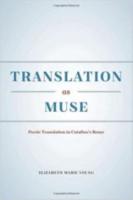
Chicago (2015) h/b 288pp £35 (ISBN 9780226279916)
Presumably this was first a doctoral thesis; it has that ferocious thoroughness and careful pursuit of all theoretical approaches and recent scholarship that mark an excellent piece of research. Its thesis is that translation is not just a stage in the development of Roman literature, which it outgrew to form an independent imaginative literature, but that translation ‘shaped their literature all along’. Since Catullus is conventionally held up as a prime example of imaginative and individual genius, Y. puts him at the centre of her argument to demonstrate how much he owes to ideas and language ‘translated’ from his forbears, particularly but not solely Callimachus, and she concludes that this ‘translation’ is the driving force behind his poetry. What is more, she sees this ‘translation’ as flaunted to demonstrate Roman usurping power.
Maintaining a ‘strategic eclecticism’, she draws on (she tells us) deconstruction, gender studies, cultural poetics and thing theory, as well as translation theory. Nonetheless, the method she proposes to follow throughout is ‘a mode of deep reading that pursues textual particulars within networks of broader cultural currents while remaining rigorously attuned to the play of poetic language’ (p.4). This looks remarkably like simple careful thorough reading.
Careful reading is exactly what she does best, with illuminating readings of a number of Catullus’s poems. For example, she has subtle things to say about the items that Thallus snatches in poem 25, placing the napkins, the mysterious cartographi, and the cloak in a context of Roman imperialism. She makes interesting capital of the pallium in particular, suggesting that Catullus might be disturbed that something which denoted his relationship to his Greek predecessors had been stolen, particularly since he himself was stealing from Greek originals.
Framing this close examination is the attempt to construct a new theory of Roman literature (her Epilogue is titled ‘Towards a Poetics of Lyric Appropriation’). This she sums up as ‘a vision of poetic production that refuses to draw a stark line between verbal larceny and self-expression’ (p.183). But have we not been here before? Often? The notion that poets achieve their place and character through a dialogue with their predecessors is surely not new. T.S. Eliot’s essay on ‘Tradition and the Individual Talent’ (1919) and Harold Bloom’s The Anxiety of Influence (1973) familiarised us with similar issues (neither of them is mentioned in the book).
Y. expresses her approach to the question as one of ‘translation’ and the word ‘translation’ is an important problem that is never satisfactorily dealt with. Flagged up in the title, and dominating the blurb, the word is drafted into service for a much more complex and difficult idea than we would conventionally understand by it, a meaning much nearer to its root meaning. It embraces imitation, copying, adaptation, echo, influence, plagiarism, transfer, tradition, allusion and becomes, in my view, too wide to be as helpful as it might be.
It is right and stimulating that she should make her bid to construct a wider theory. The fact that the reviewer is not finally convinced that one must entirely redraw one’s map of Latin poetry should not take away the fact that she demonstrates that there needs to be some change. She is a witty and intelligent critic, with whom it is a pleasure to spend time, and whose close reading of the poems is a delight.
Professor R.K.R. Thornton—University of Newcastle on Tyne
